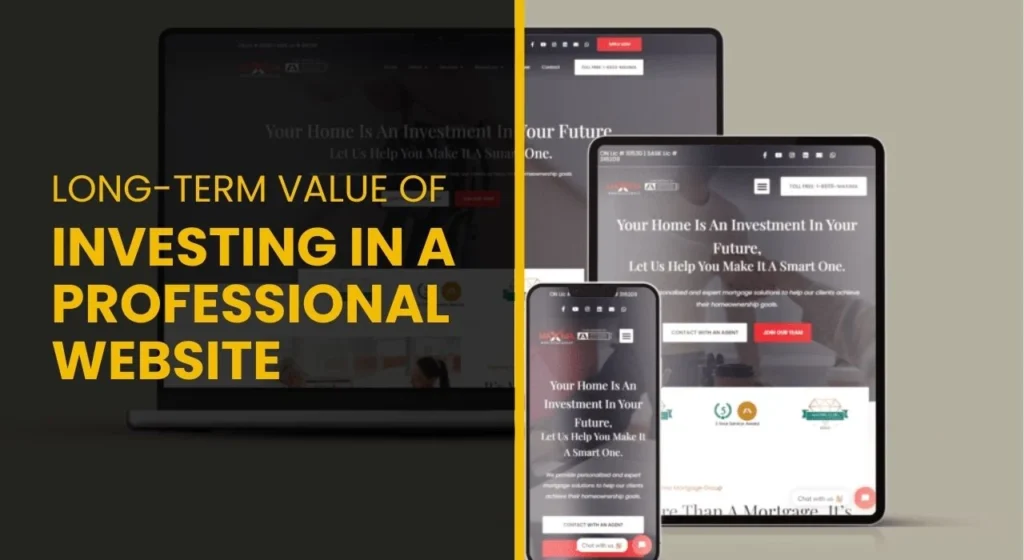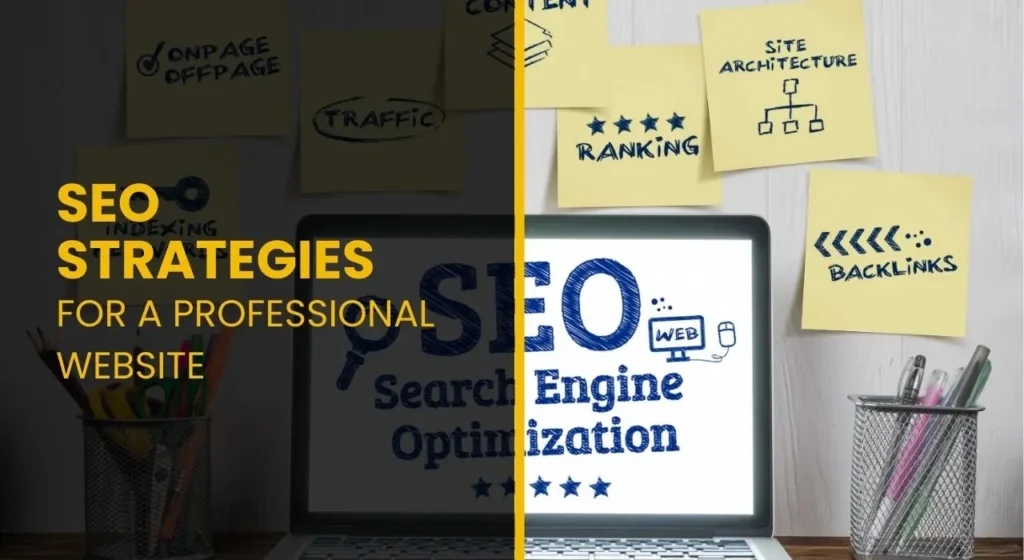Introduction
In today’s digital age, having a professional website is more than just a luxury—it’s a necessity for business success. In fact, your website can be one of the most powerful marketing tools at your disposal, acting as a virtual storefront that is open 24/7. Whether you run a small local business or a large multinational corporation, the importance of a well-designed and user-friendly website cannot be overstated. A professional website not only establishes your online presence but also helps to build trust with potential customers.
In a world where consumers rely heavily on the internet to find products and services, if your business doesn’t have a professional website, you may be missing out on valuable opportunities. Your website serves as a direct reflection of your brand, allowing you to showcase your products or services in a way that aligns with your brand voice. It’s not enough to simply have a presence on social media platforms; having a dedicated website will give your business credibility and make it easier for potential customers to find you.
Investing in a professional website is not just a one-time expense but a long-term investment that can generate a significant return. So, if you haven’t already done so, it’s time to prioritize the creation of a professional website that will set your business up for success in the digital world.
The importance of a professional website for businesses

In a world where consumers rely heavily on the internet to find products and services, if your business doesn’t have a professional website, you may be missing out on valuable opportunities. Your website serves as a direct reflection of your brand, allowing you to showcase your products or services in a way that aligns with your brand voice. It’s not enough to simply have a presence on social media platforms; having a dedicated website will give your business credibility and make it easier for potential customers to find you.
Building Credibility and Trust with a Professional Website
A professional website provides a platform to showcase your expertise and share valuable information with your target audience. By creating high-quality content such as blog posts, articles, and videos, you can position yourself as an industry leader and establish trust with potential customers. Additionally, a professional website allows you to highlight your unique selling points and differentiate yourself from competitors. Whether it’s through compelling visuals, customer testimonials, or detailed product descriptions, your website can help you stand out in a crowded marketplace.
Long-Term Value of Investing in a Professional Website
Investing in a professional website is not just a one-time expense but a long-term investment that can generate a significant return. While the initial costs may seem daunting, the benefits far outweigh the investment. A well-designed website can attract new customers, increase sales, and improve customer loyalty. It also provides a platform for ongoing marketing efforts such as email campaigns, social media integration, and search engine optimization. By continually optimizing and updating your website, you can stay ahead of the competition and adapt to changing consumer preferences.

Building trust and credibility with a professional website
One of the key benefits of having a professional website is the ability to build trust and credibility with potential customers. In today’s digital landscape, consumers are increasingly wary of businesses that don’t have an online presence. A professional website not only shows that you are serious about your business but also instills confidence in your target audience.
- Positive First Impressions: A well-designed website with a clean and modern layout conveys professionalism and attention to detail. It creates a positive first impression and encourages visitors to explore further.
- Avoid Negative Impressions: A poorly designed website with outdated visuals and clunky navigation can turn potential customers away.
- Commitment to User Experience: Investing in a professional website shows that you value your customers’ experience and are committed to providing them with a seamless online journey.
Building Trust with Social Proof and Recognition
- Customer Testimonials: Featuring positive feedback from satisfied customers helps alleviate any doubts or concerns potential customers may have.
- Showcase Industry Recognition: Displaying industry awards, certifications, or partnerships further boosts your credibility and positions you as a trusted business in your field.
Enhancing brand visibility and online presence
In today’s crowded marketplace, it’s essential to stand out from the competition and make your brand visible to potential customers. A professional website plays a crucial role in enhancing your brand visibility and establishing a strong online presence.
A well-designed website allows you to create a consistent brand identity across all online touchpoints. From the color scheme and typography to the logo and imagery, every element of your website should align with your brand guidelines. By maintaining a cohesive and recognizable brand image, you can reinforce brand recall and make a lasting impression on visitors.
Furthermore, a professional website provides an opportunity to optimize your online presence for search engines. By implementing search engine optimization (SEO) strategies, you can improve your website’s visibility in search engine results pages (SERPs). This, in turn, increases the likelihood of potential customers discovering your website when searching for relevant keywords or phrases. Higher visibility means more traffic to your website, which can lead to increased brand awareness and customer engagement.
Improving customer experience and engagement

A professional website not only attracts potential customers but also improves their overall experience and engagement with your brand. User experience (UX) plays a crucial role in website design, as it directly affects how visitors interact with your website and perceive your brand.
A well-designed website should be intuitive and easy to navigate, ensuring that visitors can find the information they are looking for quickly and effortlessly. Clear and concise menus, logical page hierarchy, and prominent calls-to-action all contribute to a positive user experience. Additionally, a professional website should be optimized for fast loading times and responsive across various devices, including desktops, tablets, and smartphones. Mobile optimization is especially important, as an increasing number of consumers use their mobile devices to browse the internet and make purchases.
Engagement is another key aspect of a professional website. By incorporating interactive elements such as videos, quizzes, surveys, and chatbots, you can encourage visitors to actively engage with your brand. This not only increases the time spent on your website but also fosters a sense of connection and involvement. Moreover, by incorporating social media integration and enabling visitors to share your content, you can extend your brand’s reach and attract new customers through word-of-mouth.
Increasing lead generation and conversion rates
A professional website serves as a powerful lead-generation tool, allowing you to capture valuable contact information from potential customers. By strategically placing lead capture forms, pop-ups, and calls-to-action throughout your website, you can encourage visitors to take specific actions, such as signing up for a newsletter, requesting a quote, or making a purchase.
To maximize lead generation, it’s important to offer something of value in exchange for contact information. This could be a free e-book, a discount code, or access to exclusive content. By providing something that is relevant and valuable to your target audience, you can incentivize them to provide their contact details and establish a direct line of communication.
Once you have captured leads, a professional website can also help increase conversion rates. By implementing persuasive copywriting techniques, creating compelling product descriptions, and optimizing your checkout process, you can guide visitors through the customer journey and encourage them to make a purchase. Additionally, by leveraging customer testimonials and showcasing social proof, you can alleviate any doubts or concerns potential customers may have and further increase conversion rates.
Website design and layout best practices

When it comes to website design and layout, there are several best practices to keep in mind to ensure a professional and user-friendly website.
Firstly, simplicity is key. A cluttered and overwhelming website can confuse visitors and make it difficult for them to find what they are looking for. Aim for a clean and minimalist design that prioritizes clarity and ease of use. Use ample white space, clear headings, and logical categorization to guide visitors through your website.
Secondly, prioritize mobile responsiveness. With the increasing use of smartphones and tablets, it’s essential that your website looks and functions well on smaller screens. Responsive design ensures that your website adapts to different screen sizes, providing a seamless user experience across devices.
Furthermore, pay attention to the visual elements of your website. Choose high-quality images and graphics that are relevant to your brand and visually appealing. Consider the color scheme and typography, ensuring that they align with your brand guidelines and are easy to read. Consistency in visual elements helps to create a cohesive and memorable brand identity.
Lastly, don’t forget about the importance of website speed. Slow-loading websites can frustrate visitors and lead to high bounce rates. Optimize your website’s loading times by compressing images, minifying code, and utilizing caching techniques. A fast-loading website not only improves the user experience but also contributes to better search engine rankings.
Mobile optimisation for a professional website
The Necessity of Mobile Optimisation
In today’s mobile-centric world, mobile optimisation is a must for a professional website. With the majority of internet users accessing websites via smartphones, ensuring your website is mobile-friendly is essential.
Responsive Design for All Devices
Mobile optimization includes responsive design, which adapts your website to various screen sizes and orientations, ensuring it functions well on smartphones, tablets, and desktops.
Simplifying Navigation for Mobile Users
Consider the limitations of smaller screens by simplifying your navigation menu and prioritizing important content. Use larger fonts and clear call-to-action buttons to enhance user interaction.
Optimising Mobile Page Load Speed
Slow-loading pages can affect user experience and increase bounce rates. Optimize mobile pages by minimizing code, compressing images, and using caching techniques to ensure fast load times.
Enhancing Mobile User Engagement and Visibility
Prioritise mobile optimisation to create a seamless user experience, increase engagement, and improve your website’s visibility in mobile search results.
SEO strategies for a professional website

Search engine optimization (SEO) is a crucial component of a professional website, as it helps to improve your website’s visibility in search engine results pages (SERPs). By implementing SEO strategies, you can attract organic traffic to your website and increase your chances of being discovered by potential customers.
Keyword research is an essential part of SEO. By identifying the keywords and phrases that your target audience is searching for, you can optimize your website’s content to align with their search intent. Incorporate these keywords naturally into your website’s copy, headings, titles, and meta descriptions to increase your chances of ranking higher in search results.
In addition to keyword optimization, it’s important to create high-quality and valuable content that resonates with your target audience. Regularly publishing blog posts, articles, and other forms of content not only keeps your website fresh and updated but also provides opportunities to target a wider range of keywords and attract more organic traffic.
Technical SEO is another important aspect of optimizing your website for search engines. Ensure that your website has clean and crawlable code, proper URL structures, and optimized meta tags. Additionally, optimize your website’s loading speed, as slow-loading websites can negatively impact your search engine rankings.
Lastly, building high-quality backlinks is crucial for SEO success. Backlinks are links from other websites that point to your website and are seen as a vote of confidence by search engines. Focus on acquiring backlinks from reputable and relevant websites to improve your website’s authority and visibility in search results.
Website maintenance and updates
Once your professional website is up and running, it’s important to prioritize ongoing maintenance and updates to ensure its optimal performance and security.
Regularly updating your website’s content is essential for keeping it relevant and engaging. This includes updating product information, adding new blog posts, and refreshing outdated content. By providing fresh and valuable content, you can encourage visitors to return to your website and increase the likelihood of converting them into customers.
Additionally, it’s important to stay on top of security updates and patches to protect your website from potential vulnerabilities. Hackers are constantly evolving their tactics, and outdated software or plugins can leave your website vulnerable to attacks. Regularly update your website’s content management system (CMS), plugins, and security measures to ensure a secure browsing experience for your visitors.
Monitoring your website’s performance is another crucial aspect of maintenance. Regularly check your website’s loading speed, broken links, and overall functionality to identify and fix any issues promptly. By providing a seamless and error-free browsing experience, you can improve user satisfaction and increase engagement.
Lastly, don’t forget about regular backups of your website’s data. In the event of a website crash, data loss, or security breach, having a recent backup ensures that you can restore your website quickly and minimize any downtime.
Conclusion
In the digital age, having a professional website is crucial for long-term business success. It serves as a virtual storefront that is open 24/7, allowing potential customers to discover your brand, explore your products or services, and make purchasing decisions. A professional website not only establishes your online presence but also helps to build trust and credibility with potential customers.
By investing in a professional website, you can enhance your brand visibility, improve customer experience, increase lead generation, and boost conversion rates. Additionally, a well-designed and user-friendly website allows you to showcase your expertise, differentiate yourself from competitors, and position yourself as an industry leader.
However, creating a professional website is not a one-time task; it requires ongoing maintenance, updates, and optimisation to ensure its optimal performance and security. By regularly updating your website’s content, optimising it for search engines, and monitoring its performance, you can stay ahead of the competition and adapt to changing consumer preferences.
In conclusion, a professional website is not just a luxury but a necessity for businesses in today’s digital landscape. It’s a long-term investment that can generate a significant return by attracting new customers, increasing sales, and improving customer loyalty. So, if you haven’t already done so, now is the time to prioritise the creation of a professional website that will set your business up for success in the digital world.
Frequently Asked Questions
1. Why is having a professional website important for my business?
A professional website establishes your online presence, builds trust with customers, and helps you stand out in a competitive market. It serves as a 24/7 virtual storefront, enhancing brand credibility.
2. How does a professional website help build trust with customers?
A clean, well-designed website with positive customer testimonials, industry certifications, and easy navigation demonstrates professionalism and encourages potential customers to trust your business.
3. What is mobile optimisation, and why is it necessary?
Mobile optimization ensures your website is responsive and user-friendly on mobile devices. With most consumers accessing websites via smartphones, it’s essential for providing a seamless experience and boosting engagement.
4. How can SEO help improve my website’s performance?
SEO strategies, such as keyword optimization, high-quality content creation, and technical SEO, can increase your website’s visibility in search results, driving more traffic and improving customer acquisition.
5. How often should I update my website?
Regular updates to your website’s content, security patches, and performance checks are essential to maintain its relevance, security, and optimal functionality. Consistent updates keep your site engaging and competitive.










